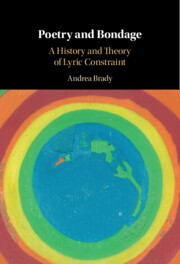Book contents
- Poetry and Bondage
- Poetry and Bondage
- Copyright page
- Dedication
- Contents
- Illustrations
- Acknowledgements
- Introduction The Fetters of Verse
- Part I Lyric Cells
- Part II The Songs of Slavery
- Chapter 5 Bind Me – I Still Can Sing
- Chapter 6 The Story that Cannot Be Told
- Chapter 7 The Sound Came from Everywhere and Nowhere
- Chapter 8 Singing at the Window
- Part III Pleasures and Ornaments
- Index
Chapter 5 - Bind Me – I Still Can Sing
Emily Dickinson at the Boundaries of Lyric
from Part II - The Songs of Slavery
Published online by Cambridge University Press: 08 October 2021
- Poetry and Bondage
- Poetry and Bondage
- Copyright page
- Dedication
- Contents
- Illustrations
- Acknowledgements
- Introduction The Fetters of Verse
- Part I Lyric Cells
- Part II The Songs of Slavery
- Chapter 5 Bind Me – I Still Can Sing
- Chapter 6 The Story that Cannot Be Told
- Chapter 7 The Sound Came from Everywhere and Nowhere
- Chapter 8 Singing at the Window
- Part III Pleasures and Ornaments
- Index
Summary
The tropes of bondage that pervade Emily Dickinson’s lyric poems were significant to contemporary American accounts of the lyric and its relation to individual liberty. Dickinson is often held up as the paradigmatic lyric poet: reclusive, but unbounded in her imagination; pure voice, speaking on the other side of the door. Dickinson herself returns endlessly to tropes of the prison, chains and bonds. At times she even expresses a sadistic delight in imagining the torture of others. The chapter argues that, given the convulsions of her time and her family’s direct political engagements with the Kansas-Nebraska Act, the Fugitive Slave Act and the Civil War, it is surprising that slavery is almost entirely absent from Dickinson’s poetry. The chapter reflects on the tropes of incarceration or bondage in Dickinson’s poetics, to consider what the missing slave means for the model of lyric that she has come to represent.
Keywords
- Type
- Chapter
- Information
- Poetry and BondageA History and Theory of Lyric Constraint, pp. 151 - 179Publisher: Cambridge University PressPrint publication year: 2021



